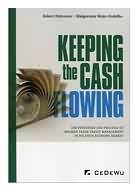Keeping the cash flowing the principles and practice of modern trade credit management
in Poland's economy market
This book explores an important but often neglected aspect of a firm's finances: trade
credit management (TCM).
When firms offering credit to each other so purchases can be made on open account it is
a vital source of business-to-business credit flows. Trade credit is the life-blood of
competitive economies. Trade credit involves taking calculated credit risks. In return,
selling firms boost sales and profitability. Buying firms get access to credit. But trade
credit has to be carefully managed. To generate cash, accounts receivable need to be
collected. In the meantime, working capital must be managed so that cash flow is
sufficient to pay the firm's bills. The price of error is financial distress and even
bankruptcy. The book explores the topic from many angles and is anchored in the hard
realities of Poland's marketplace. Particular attention is paid to the dynamics of trade
credit in small to medium enterprises, firms which often have special needs.
The focus of this book is threefold:
• the analysis of the role of TCM from inside and outside of the firm;
• a detailed investigation of best practice in TCM collection processes;
• the presentation of issues concerning working capital management.
AUTHORS‘ FOREWARD
PART I: Big Picture Overview
LOOKING INSIDE THE FIRM
I. The Accounts Receivable Investment
Why Carry Accounts receivable?
Measuring the Receivables Investment
Trade Credit and Elasticity of Demand
What Does Offering Trade Credit Cost?
II. The Perennial Finance-Sales Tension
III. The Psychological Dimension of TCM
Easily Overlooked
Leaning on the Trade
Collection Games
The Role of Confidence in Patience
LOOKING OUTSIDE THE FIRM
IV. Macro-economic Conditions
Business Failure: Bad Debts
How Much Risk Is Out There? Bankruptcy Patterns in Poland
Bad Debts as a Cost of Business
The Credit Cycle
Industry Patterns in TCM
V. Institutional Infrastructure
Legal Status of Unsecured Trade Debt
Access to Bank Credit
Trust and Business Confidence
Credit Information Infrastructure
Credit Bureau-Generated Credit Scores
Polish Market
PART II: The TCM Collections Cycle
OVERVIEW OF THE TCM COLLECTIONS CYCLE
I. Formulating A Credit Policy
Strategic context
Terms of sales: Liberal or Tight?
II. Information Gathering
Information Appetite
Customer Files
Establishing Identity
Guarding Against the Possibility of Fraud
Information Sources
Trade References
The Economics of Search Costs
III. Credit Risk Assessment
The Five Cs in Action
Setting Credit Limits
Credit Scoring
IV. Monitoring & Collection
Collection Steps
V. Dealing With Default
Dunning
PART III: Financial Management Issues
I. Liquidity Management
TCM & Liquidity Management
Arranging bank credit
Accounts Payable Management
Cash Management
II. Overtrading
III. Risk Transference
Bank Letter of Credit (L/C)
Domestic Credit Insurance
Factoring
APPENDIX A
Some Suggested TCM Reforms
APPENDIX B
Useful Websites
APPENDIX C
Glossary of Trade Credit Management Terms
REFERENCES
246 pages, Paperback


